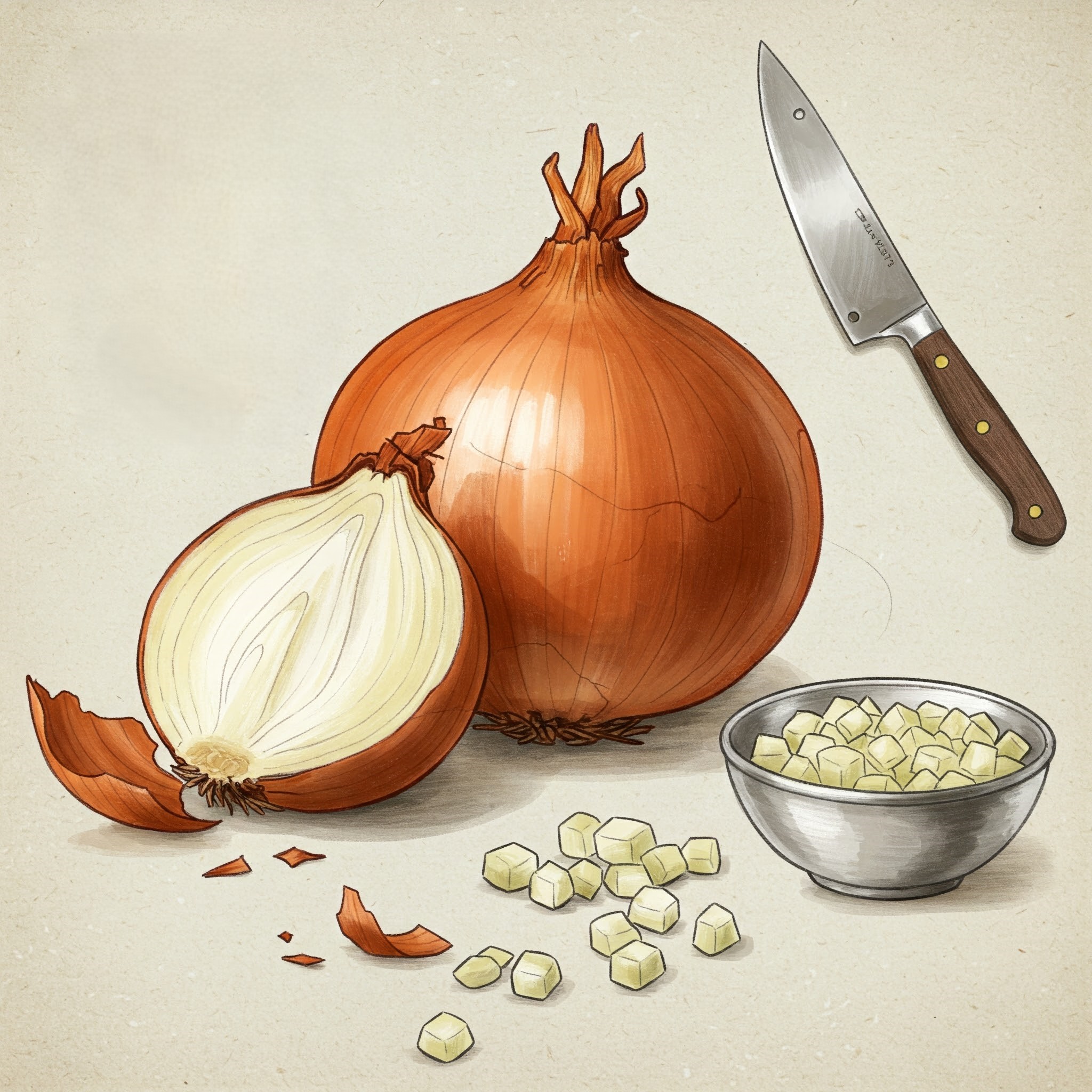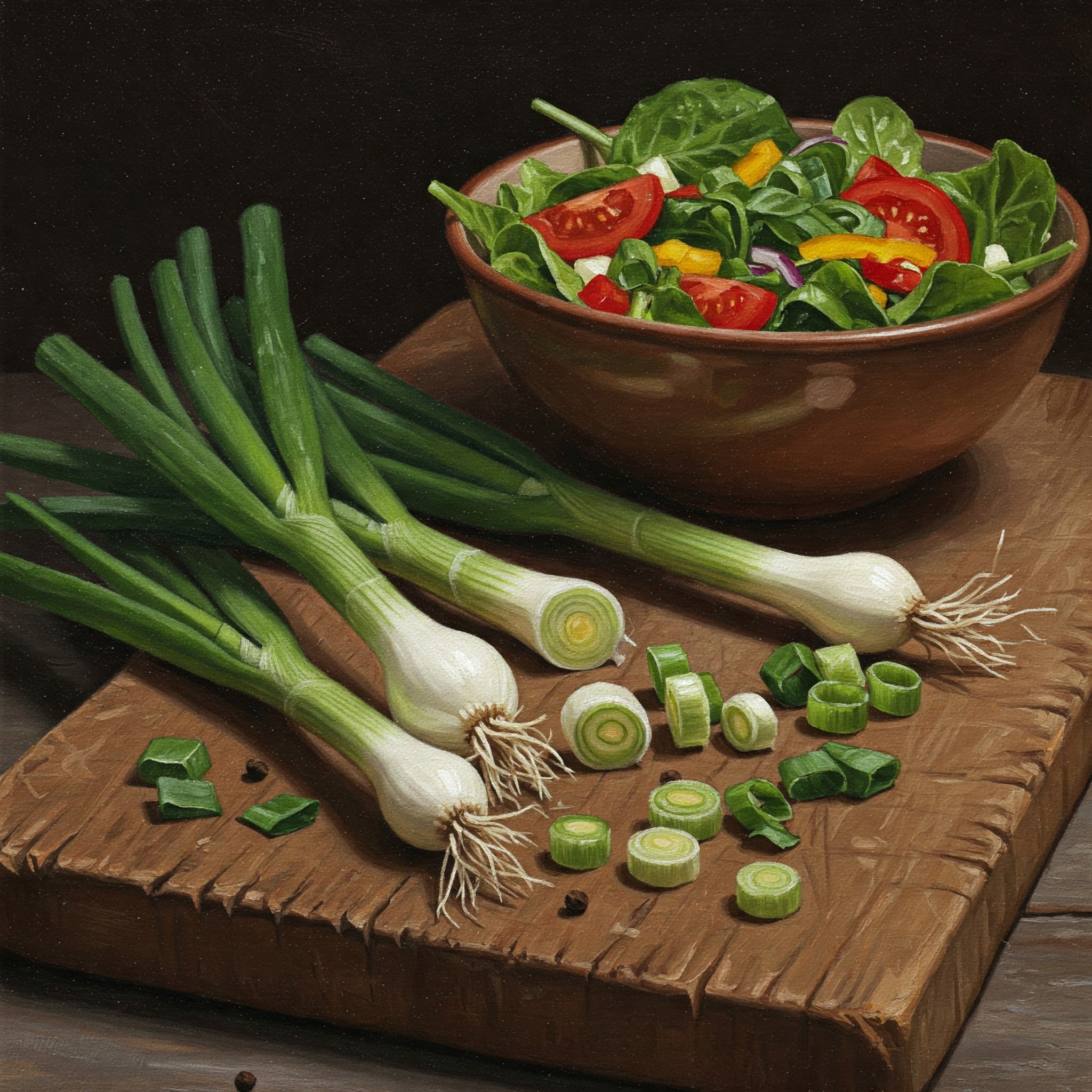Onion
Definition
An onion is a noun referring to a bulbous vegetable (Allium cepa) widely used in cooking for its distinct flavor and aroma. It belongs to the Allium family, which includes garlic, leeks, and chives.
Parts of Speech
- Noun
Pronunciation
American English
- IPA Pronunciation: /ˈʌn.jən/
- Respelling: UHN-yuhn
British English
- IPA Pronunciation: /ˈʌn.jən/
- Respelling: UHN-yuhn
Etymology
The word "onion" originates from the Old French "oignon," derived from the Latin "unio," meaning "a single or unity," referencing the onion’s single bulb. The term entered Middle English in the 12th century and has since been used to describe this widely cultivated vegetable.
Derivatives
- Onion-like (adjective)
- Oniony (adjective, informal)
- Onion bulb (noun)
- Spring onion (noun)
- Onion skin (noun)
Synonyms
- Bulb
- Shallot
- Scallion
Antonyms
- None
Usage
The term "onion" is widely used in culinary contexts. For example: "Chop the onion finely before sautéing it." It is also used figuratively, as in "Life is like an onion; you peel it one layer at a time."
Related Terms
- Garlic: A close relative of the onion with a strong aroma and flavor.
- Leek: Another member of the Allium family with a milder taste.
- Chive: A herbaceous plant with a flavor similar to onions.
Detailed Definitions
Noun
- A bulbous vegetable: Refers to the edible bulb of the Allium cepa plant.
- Example: "The recipe calls for one chopped onion."
- A plant of the Allium family: Describes the entire plant, including its green stalks and roots.
- Example: "Spring onions are often used in salads."
- Figurative usage: Represents complexity or layers, often in a metaphorical sense.
- Example: "Unraveling the mystery was like peeling an onion."
onion



🇨🇳 Mandarin Chinese
- "洋葱" (Yángcōng)
- Pronunciation: /jɑ̌ŋ tshʊ́ŋ/
- Respelling: "yahng-tsuhng"
🇮🇳 Hindi
- "प्याज" (Pyāj)
- Pronunciation: /pjaːd͡ʒ/
- Respelling: "pyaaz"
🇪🇸 Spanish
- "Cebolla"
- Pronunciation: /seˈβoʝa/
- Respelling: "se-bo-ya"
🇫🇷 French
- "Oignon"
- Pronunciation: /ɔɲɔ̃/
- Respelling: "on-yon"
🇸🇦 Arabic (Modern Standard)
- "بصل" (Basal)
- Pronunciation: /ˈbasˤal/
- Respelling: "basal"
🇧🇩 Bengali
- "পেঁয়াজ" (Pēẏāja)
- Pronunciation: /pẽjaʤ/
- Respelling: "penyaj"
🇷🇺 Russian
- "Лук" (Luk)
- Pronunciation: /luk/
- Respelling: "look"
🇵🇹 Portuguese
- "Cebola"
- Pronunciation: /sɨˈβɔlɐ/
- Respelling: "se-bo-la"
🇮🇩 Indonesian
- "Bawang"
- Pronunciation: /bawang/
- Respelling: "ba-wang"
🇩🇪 German
- "Zwiebel"
- Pronunciation: /ˈt͡sviːbl̩/
- Respelling: "tswie-bel"
🇯🇵 Japanese
- "玉ねぎ" (Tamanegi)
- Pronunciation: /tamanegi/
- Respelling: "ta-ma-ne-gi"
🇻🇳 Vietnamese
- "Hành tây"
- Pronunciation: /hɐŋ˧˩˧ taːj˧˩˧/
- Respelling: "hanh tay"
🇰🇷 Korean
- "양파" (Yangpa)
- Pronunciation: /jaŋ.pa/
- Respelling: "yang-pa"
🇹🇷 Turkish
- "Soğan"
- Pronunciation: /ˈsoːan/
- Respelling: "so-an"
🇵🇰 Urdu
- "پیاز" (Pyāz)
- Pronunciation: /pjaːz/
- Respelling: "pyaaz"





